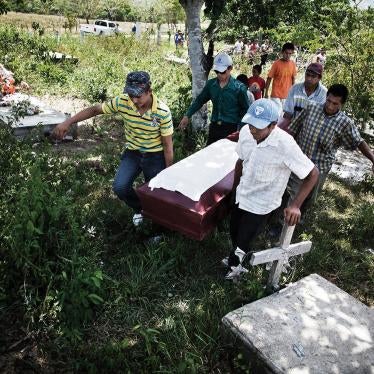(Washington, DC, November 20, 2008) – Colombia needs to do much more to address its human rights problems before the US Congress should consider the US-Colombia Free Trade Agreement (FTA), Human Rights Watch said today in a letter to Nancy Pelosi, speaker of the House of Representatives. The letter was also addressed to Representative George Miller, chairman of the House Committee on Education and Labor, and Representative Charles Rangel, chairman of the House Ways and Means Committee.
“Under US pressure related to the FTA, Colombia has started to take some positive steps on impunity for anti-union violence,” Kenneth Roth, executive director of Human Rights Watch, wrote in the letter. “But those steps are limited and incomplete, and in other areas (such as the rate of violence), Colombia has been sliding back this year.”
The seven-page letter lists several serious problems not yet addressed by Colombia that affect workers’ ability to exercise their rights. Problems include: the ongoing high rate of anti-union violence, which has killed 41 trade unionists so far this year; new armed groups that are threatening and killing union members; ongoing stigmatization of union members as guerrillas by senior government officials; and extrajudicial executions by the army.
Since 1986, 2,685 trade union members have been killed in Colombia, according to the National Labor School, Colombia’s leading labor rights group. Colombia has the world’s worst record on these assassinations, with up to half of such killings worldwide each year taking place there.
Colombia’s attorney general has established a specialized group of prosecutors to investigate unsolved cases, and there have been convictions in 96 cases in the last two years. But this is only a very small percentage of the total.
According to Human Rights Watch, there also are serious reasons to be concerned over the sustainability of that progress. The special prosecutors are not investigating the majority of reported cases, instead relegating them to ordinary prosecutors who do not have the resources or expertise to handle them.
Human Rights Watch also said that many of the convictions involve paramilitary members who are admitting their crimes under the Justice and Peace Law, which offers them reduced sentences in exchange for confessions. Once the confessions process is completed, the rate of convictions could drop sharply. And these convictions do little to further truth or justice, as paramilitary members often provide little information about the circumstances surrounding the killings, and their sentences ultimately could be reduced to five to eight years, for all their crimes, including crimes against humanity and other atrocities.
Human Rights Watch noted that, were it not for Congress’s decision to delay consideration of the trade agreement, Colombia would probably never have taken even the limited steps it has to address the issue. Human Rights Watch urged Congress to continue postponing consideration of the deal until Colombia shows concrete and sustained results in addressing its serious human and labor rights problems.







